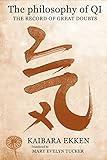The Philosophy of Qi : The Record of Great Doubts / Kaibara Ekken.
Material type: TextSeries: Translations from the Asian ClassicsPublisher: New York, NY : Columbia University Press, [2007]Copyright date: ©2007Description: 1 online resource (208 p.) : 27 illustrationsContent type:
TextSeries: Translations from the Asian ClassicsPublisher: New York, NY : Columbia University Press, [2007]Copyright date: ©2007Description: 1 online resource (208 p.) : 27 illustrationsContent type: - 9780231139229
- 9780231511292
- 181/.12 22
- B5244.K253 T3513 2007
- B5244.K253 T3513 2007eb
- online - DeGruyter
- Issued also in print.
| Item type | Current library | Call number | URL | Status | Notes | Barcode | |
|---|---|---|---|---|---|---|---|
 eBook
eBook
|
Biblioteca "Angelicum" Pont. Univ. S.Tommaso d'Aquino Nuvola online | online - DeGruyter (Browse shelf(Opens below)) | Online access | Not for loan (Accesso limitato) | Accesso per gli utenti autorizzati / Access for authorized users | (dgr)9780231511292 |
Frontmatter -- CONTENTS -- ACKNOWLEDGMENTS -- INTRODUCTION -- Taigiroku: The Record of Great Doubts -- PREFACE -- PART I -- PART II -- GLOSSARY -- BIBLIOGRAPHY -- INDEX -- Backmatter
restricted access online access with authorization star
http://purl.org/coar/access_right/c_16ec
The Record of Great Doubts emphasizes the role of qi in achieving a life of engagement with other humans, with the larger society, and with nature as a whole. Rather than encourage transcendental escapism or quietism, Ekken articulates a philosophy of material force as a basis of living a life of commitment to the world. In this spirit, moral cultivation is not an isolated or a self-centered preoccupation, but an activity that occurs within the dynamic forces of nature and amid the rigorous demands of society. In this context, a vitalism of qi is an emergent force, not only providing the philosophical grounding for this vibrant interaction but also giving a basis for an investigation of the natural world that plumbs the principle within things. Ekken thus aimed to articulate a creative and dynamic milieu for moral education, political harmony, social coherence, and agricultural sustainability. The Record of Great Doubts embodies Ekken's profound commitment to Confucian ideas and practices as a method for establishing an integrative ethical vision, one he hoped would guide Japan through a new period of peace and stability. A major philosophical treatise in the Japanese Neo-Confucian tradition, The Record of Great Doubts illuminates a crucial chapter in East Asian intellectual history.
Issued also in print.
Mode of access: Internet via World Wide Web.
In English.
Description based on online resource; title from PDF title page (publisher's Web site, viewed 02. Mrz 2022)


